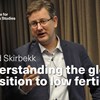depart
In defense of value incomparability: A reply to Dorr, Nebel, and Zuehl
Noûs Abstract Cian Dorr, Jacob Nebel, and Jake Zuehl have argued that no objects are incomparable in value. One set of arguments they offer depart from a principle they call ‘Strong Monotonicity’, which
Research seminar with Vegard Skirbekk: Understanding the global transition to low fertility
Venue: Institutet för framtidsstudier, Holändargatan 13 i Stockholm Research seminar with Vegard Skirbekk, professor at Columbia Aging Center, Columbia University and senior researcher at the Norwegian I

Vegard Skirbekk: Understanding the global transition to low fertility
Globally, women are having half as many children as they had just fifty years ago. Why have birth rates fallen, and how will low fertility affect our shared future? The vast majority of current resear
The end of capitalism? On how to create a vision of a sustainable future
This is an event organized in cooperation with Fri Tanke. Not too long ago, it was said that democracy had finally triumphed over totalitarian societal systems, and that long-term economic growth would
The Problems of Philosophy in Virtual Reality
Venue:The Institute for Futures Studies, Holländargatan 13, Stockholm, and online This event is open to the public.Conference poster. This conference will depart from and engage with the recent and critby Professor David Chalmers.
Should Extinction Be Forever?
Should Extinction Be Forever?, Philosophy and Technology, First online: 17 october 2015 This article will explore a problem which is related to our moral obligations towards species. Although the re-cr, (6128), 32–33, ). This article will provide an argument in favour of re-creation based on normative considerations. The environmentalist community generally accepts that it is wrong to exterminate species, for reasons beyond any instrumental value these species may have. It is often also claimed that humanity has a collective responsibility to either preserve or at least to not exterminate species. These two beliefs are here assumed to be correct. The argument presented here departs from and places these two ideas in a deontological framework, from which it is argued that when humanity causes the extinction of a species, this is a moral transgression, entailing a residual obligation. Such an obligation implies a positive duty to mitigate any harm caused by our moral failure. In light of recent scientific progress in the field of genetic engineering, it will be argued that humanity has a prima facie obligation to re-create species whose extinction mankind may have caused, also known as de-extinction.








